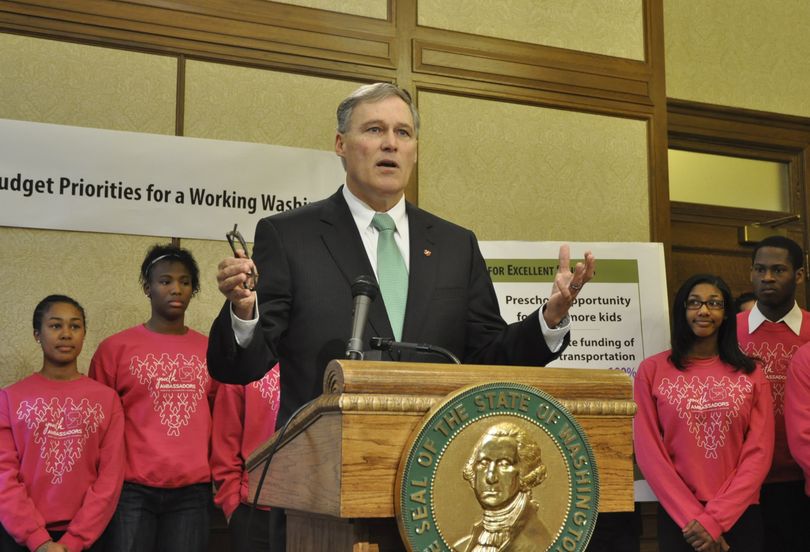Inslee: Extend temporary taxes, close loopholes to spend more on schools

Gov. Jay Inslee explains his budget as students from Seattle's Cleveland High School look on.
OLYMPIA — The state should make temporary tax increases on beer and some business services permanent, cancel a variety of other tax breaks and spend an extra $1.2 billion on public schools, Gov. Jay Inslee said Thursday.
Standing in front of a group of Seattle high school students involved in a program to boost science and math skills, the governor released his first budget proposal. It’s a plan for expanded programs from pre-kindergarten to high school, designed to satisfy a state Supreme Court order to adequately fund public schools.
“We must do hard things. It’s the right thing to choose education over these tax breaks,” he said at a press conference to announce his spending plan for the 2013-15 budget cycle.
The proposal met quick resistance from Senate Republicans, who will likely release the first full budget in the Legislature next week. It will not propose tax increases or ending the tax exemptions Inslee proposed, Sen. Mark Schoesler of Ritzville, the Senate Republican leader, said. . .
To continue reading about the budget propsal, and reaction, or to comment, click here to go inside the blog.
. . . One such tax exemption, which would limit the trade-in value of vehicles to $10,000 before sales tax would be levied, would hurt car sales just as they were beginning to pick up, Schoesler said. Another exemption proposed by Inslee, to collect sales tax on bottled water, was rejected at the ballot box.
“It wasn't that long ago voters said no,” Schoesler said, holding up a bottle of water. “I don't have any children available for a prop.”
House Democrats, who will release their own budget proposal sometime after the Senate plan, called Inslee’s budget a move in the right direction. “We may not agree with everything at this point,” said Rep. Ross Hunter, D-Medina, chairman of the Appropriations Committee. “It’s the start of something we can work on.”
The House budget proposal will suggest tax increases, although not necessarily the same ones as Inslee, Hunter said.
Inslee said he was making a distinction between new taxes, which he said he would veto during last year’s campaign, and closing tax loopholes, which he said he would do. He also contended that extending taxes set to expire on June 30 and making them permanent was not a violation of his tax promise.
One temporary taxes adds a three-tenths of 1 percent surcharge on the business and occupation tax paid by doctors, lawyers, accountants and some other professions. The other is a 50-cent per gallon tax on beer.
The latter would be made permanent and extended from the large national brewing companies like Miller and Anheuser Busch, to all brewers. Microbreweries were left out of the 2011 tax in what was described at the time as a way to help growing local businesses. David Schumacher, Inslee's budget director, said the administration did not consider that a new tax on microbreweries but removing an exemption they were getting from the tax larger companies pay.
Keeping and extending the 50-cent per gallon beer tax — it works out to about 28 cents on a six-pack — and the surcharge on professional business services raises about $660 million over the next two years. Repealing or changing 11 other tax exemptions or preferences would raise another $561 million.
Among those proposals: collecting sales tax on bottled water, on custom computer software and on purchases made by some out-of-state residents shopping in Washington. The trade-in exemption on cars would be limited to $10,000, and preferential business tax rates for most industries would be cut by 25 percent. Excluded from that jump in business taxes would be the aerospace industry and those involved in nuclear waste cleanup at the Hanford Nuclear Reservation.
Eliminating tax exemptions has always proved difficult in the past, he acknowledged: “We must do hard things. It’s the right thing to choose education over these tax breaks.”
Groups that represent education and social service groups gave the budget high marks. The Association of Washington Business said it supported his desire to spend more on education but opposed the tax increases.
Senate Republicans and the two Democrats who joined them to form a coalition majority, have said repeatedly they won’t extend the temporary taxes and are unlikely to close many exemptions.
Sen. Mike Padden, R-Spokane Valley, accused Inslee of “bait and switch” by talking about the need to increase jobs during the 2012 campaign then proposing his first budget that would cost the state jobs by closing tax breaks for businesses. The economy is better than in 2010, when those taxes were enacted with the promise they’d be gone, and the state can expect to bring in $2 billion more in the next two years than it will in the current budget cycle, he said.
With that $1.2 billion in additional tax revenue, Inslee proposes to expand pre-school programs and all-day kindergarten, reduce class sizes in kindergarten and first grade in schools in high poverty areas, higher 1,400 more teachers for middle and high schools, put more into professional development for principals and teachers and improve education in science, technology, engineering and math.
He also proposes freezing tuition at the state's community and technical colleges for the next two years, and limiting tuition growth to 3 percent at the regional universities and 5 percent at Washington State University and University of Washington. The universities could raise tuition above those levels, but only by expanding student aid.
Senate Republicans have a proposal to lower tuition at the universities by 3 percent. Sen. Mike Baumgartner, R-Spokane, a sponsor of the plan, said tuition is already too high and allowing it to rise further was “irresponsible.”
